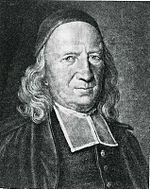Samuel Heinrich King
Samuel Heinrich König (also Samuel König ; born September 17, 1671 in Gerzensee in the canton of Bern ; † May 30, 1750 in Bern ) was a Reformed theologian of a pietistic direction, as well as a professor of oriental studies and mathematics. He was the father of the mathematician Johann Samuel König .
Life
1671–1698: Youth and Education
Samuel Heinrich König was the son of Samuel Königs, the pastor of Gerzensee in the canton of Bern . It was recognized early on as a miracle of learning, which sought its equal in everything that was knowable . He received his education first in Bern, where he already showed a preference for the study of oriental languages, then in Zurich and on an academic trip to the Netherlands and England . In England it was shaped by a rapturous mysticism with chiliastic features.
1698–1699: Parish office in Bern
Back in Bern, he was accepted into the parish and in 1698 employed as a senior hospital preacher at the Heiliggeistkirche . At first, however, he strove - not without ambition - more for scientific fame than for church work, but soon joined more and more pietistic circles and gradually came into an increasingly decisive opposition to the strictly orthodox in teaching but badly neglected in its morals Clergy.
Persecuted by the higher church authorities, initially taken under protection by the more tolerant school council, King was finally viewed with suspicion by the government.In 1699, along with some like-minded people, he was interrogated by a specially appointed religious commission , threatened, raised his office, denied citizenship and renounced the country referenced. The resulting political unrest was fought by the obligation of a so-called association oath , by which all church and state officials solemnly undertook to suppress any religious innovation.
1698-1730: exile
König first went to Herborn , where he probably hoped to find an office, but as a Swiss arch seducer and arch heretic , he was also expelled from there and turned to Berleburg , Halle and Magdeburg . He remained unemployed for twelve years until he was accepted as pastor and court preacher by the Count of Isenburg-Büdingen in 1711 . Here, calmer, he turned more and more to science, wrote a Greek-Hebrew dictionary and some theological writings. On August 13, 1711, König married Anna Maria Nöthiger. His wife gave birth to nine children in Büdingen: Johann Samuel (* July 31, 1712), Gottlieb Ludwig (* December 17, 1713), Margarethe Salome (* December 20, 1715), Juliana Henriette (* December 19, 1717), Susanna Henriette (* June 11, 1719), Henriette (* July 24, 1720), Auguste Albertina (* May 25, 1722), J. Daniel (* September 13, 1725) and Maria Barbara (* September 29, 1727). König resigned his office in 1715, but stayed in Büdingen. From 1720 to 1730 he was responsible for the community in Waldensberg (now Wächtersbach ).
1730–1750: Professorship in Bern
König was only allowed to return to Bern in 1730, when the mood had changed somewhat in his favor. He became professor of oriental languages and mathematics at the high school . However, he did not give up his spiritual work and made even longer journeys for this purpose. In 1744 he had to see how two of his sons, along with Samuel Henzi for participating in a political, against the oligarchy of patrician directed movement, just had to leave him the land.
factories
- Dissertatio theologica de foedere et testamento Dei (1692)
- Specimen disputationem germaricarum, excerptum ex codice talmudico Beracoth (1696)
- The Way of Peace (1700)
- Passion thoughts for the edification of souls eager for salvation simply communicated ... (1707)
- Theological forecast of the fall of the Turkish Empire (1717)
- Etymologicon Helleno-Hebraeum (1722)
- Principles of the general grace of God ... (1723)
- Explanation of the first epistle Johannis (1726)
- Theologica mystica (1730)
- Dissertatio philologico-theologica de ritu et mysterio circumcensionis ... (1731)
- Oratio inauguralis de mysterio Christi et ecclesiae (1731)
- Drey Christian Sermons (1732)
- Pemptas conconium sacrarum (1733)
- Reflections on the Inner Kingdom of God (1734)
- Written report of the true and living faith and the Evangelical Magisterium (1737, ²1742)
literature
- Rudolf Dellsperger : King, Samuel. In: Historical Lexicon of Switzerland .
- Emil Blösch : King, Samuel . In: Allgemeine Deutsche Biographie (ADB). Volume 16, Duncker & Humblot, Leipzig 1882, p. 520 f.
- Rudolf Dellsperger: King, Samuel. In: New German Biography (NDB). Volume 12, Duncker & Humblot, Berlin 1980, ISBN 3-428-00193-1 , p. 349 f. ( Digitized version ).
- Susanne Siebert: King, Samuel Heinrich. In: Biographisch-Bibliographisches Kirchenlexikon (BBKL). Volume 4, Bautz, Herzberg 1992, ISBN 3-88309-038-7 , Sp. 284-286.
Web links
| personal data | |
|---|---|
| SURNAME | King, Samuel Heinrich |
| ALTERNATIVE NAMES | King, Samuel |
| BRIEF DESCRIPTION | Mathematician, orientalist and pietistic theologian |
| BIRTH DATE | 17th September 1671 |
| PLACE OF BIRTH | Gerzensee , Canton of Bern |
| DATE OF DEATH | May 30, 1750 |
| PLACE OF DEATH | Bern |
